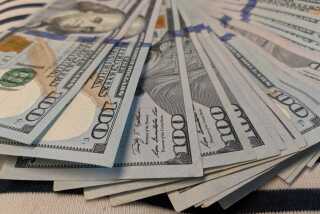Currency Traders Cash In on Dollar’s Whip-Sawing
- Share via
The gyrations of the dollar this week had only minor practical impact on big U.S. companies that do business overseas. But for U.S. banks and brokerage houses that trade currencies, it has been a hectic and profitable time.
“When we have more volatility in the markets, we have more opportunity to gain,” said Guiseppe Dose, manager of Bank of America’s San Francisco trading center, where traders are working around the clock to capture the gains.
Market makers such as Bank of America widen their spread--the difference in price between what they buy currencies for and what they sell them for--to protect themselves during volatile times. And heavy trading means more commissions.
“The volatility is definitely profitable to the banks involved in currency transactions,” Dose said. Traders are “tired, but excited.”
However, Wednesday was a surprisingly normal business day for many U.S. firms that sell their products in Europe. That was despite the fact that a key British interest rate jumped 5 percentage points, and the overnight inter-bank interest rate in Sweden soared to 500%, which boosted the dollar.
Many multinational companies employ sophisticated currency hedging programs to cushion against the ups and downs of the dollar.
What’s more, foreign currency translations generally are done on a particular day each month or each quarter, which differs depending on the company. So for many firms, it comes down to the luck of the draw: If a company did its currency translation on Wednesday--after the dollar rallied sharply--it probably was hit hard. If not, then it wasn’t.
Once a month, Mattel settles all inter-company payments among manufacturing and marketing units scattered all over the world. The El Segundo-based toy maker was fortunate to have done that Tuesday instead of Wednesday, said Michael McCafferty, Mattel’s treasurer and senior vice president.
“We were lucky--very lucky--that we settled it (Tuesday), when the dollar was weaker,” he said.
But, multinationals find, even these costs may eventually even out, given the dollar’s volatility.
“We’re in 185 countries around the world, and part of being such a global company is you work on managing your currency,” said Polly Howes, spokeswoman for Coca-Cola in Atlanta.
“That’s a very important part of what we do,” she said. “It’s something that we’re used to doing because we do business on such a broad scale.”
More to Read
Inside the business of entertainment
The Wide Shot brings you news, analysis and insights on everything from streaming wars to production — and what it all means for the future.
You may occasionally receive promotional content from the Los Angeles Times.









